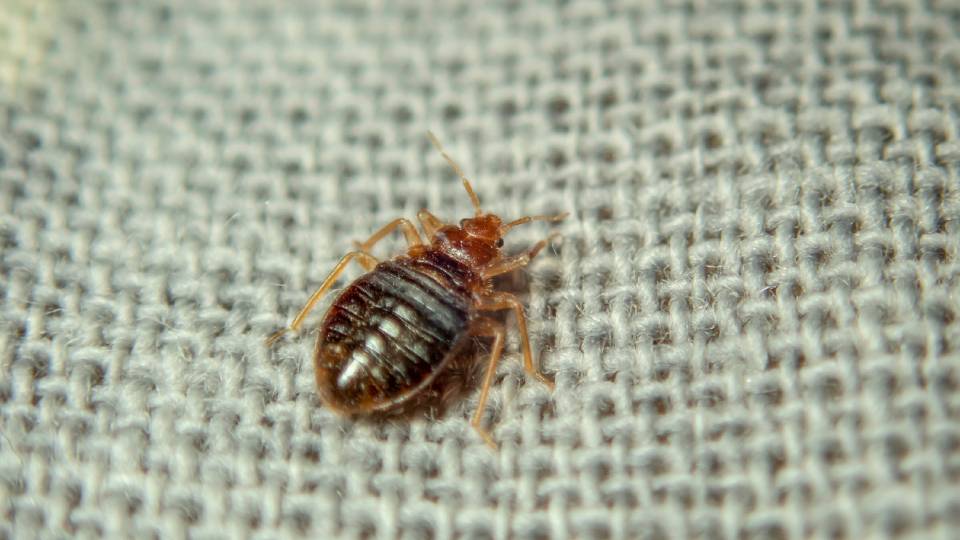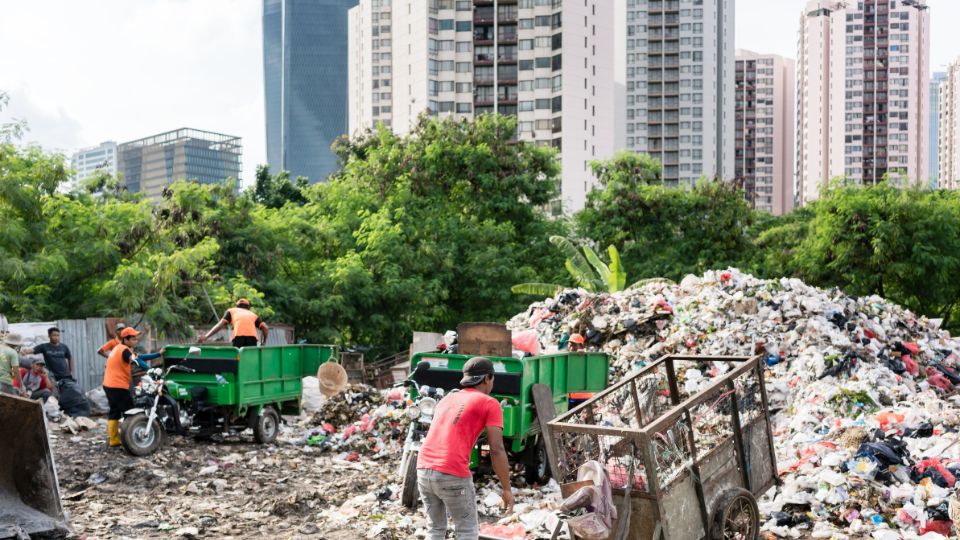
Managing the hotel waste your business generates is incredibly important.
Hotels, with their constant influx of guests and various operations, generate significant amounts of waste daily which affect the profits of the hotel and damages the external environment.
From food scraps to packaging materials, understanding and effectively managing hotel waste is crucial for both environmental sustainability and regulatory compliance.
In this guide, we provide easy-to-digest information on everything UK hotel owners need to know about hotel waste, including regulations, disposal methods, and sustainable practices.
Table of Contents:
- What is Hotel Waste?
- Hotel Waste Management Strategies
- Hotel Waste Laws and Regulations in the UK
- Sustainable Practices in Hotel Waste Management
- Hotel Waste Facts & Statistics
- Conclusion

What is Hotel Waste?
Hotel waste is any waste that is generated from your hotel’s actions.
Some examples of this could be:
General Waste
General waste refers to non-hazardous waste that does not fit into specific recycling categories.
It includes a variety of materials commonly found in everyday hotel operations:
- Plastic packaging with food residue (e.g., yoghurt containers, snack wrappers)
- Mixed paper and cardboard with contamination (e.g., greasy pizza boxes, wax-coated paper)
- Mixed packaging materials (e.g., Tetra Pak cartons, multi-layered snack packaging)
- Used textiles and fabrics beyond reuse (e.g., worn-out towels, torn bedding)
You can read more about disposing of mattresses in our dedicated guide
- Metal items with contamination (e.g., aluminium foil with food remnants, mixed metal packaging)
- Organic residue mixed with non-compostable materials (e.g. food waste with plastic wrappers)
- Miscellaneous items (e.g., broken electronics, disposable hygiene products, damaged items)
Dry Mixed Recycling
Dry mixed recycling refers to the collection and processing of various recyclable materials that can be sorted and recycled.
It encompasses a wide range of commonly recycled items found in hotel operations:
- Clean and dry paper and cardboard (e.g., newspapers, cardboard boxes, office paper)
- Plastic bottles and containers (e.g., water bottles, soda bottles, shampoo bottles)
- Metal cans and aluminium foil (e.g., beverage cans, food cans, aluminium foil)
- Clean and dry glass bottles and jars (e.g., wine bottles, jam jars, sauce bottles)
- Clean and dry plastic packaging (e.g., yoghurt pots, plastic trays, detergent bottles)
- Clean and dry Tetra Pak cartons (e.g., juice cartons, milk cartons, soup cartons)
- Clean and dry cardboard packaging (e.g., cereal boxes, packaging boxes, egg cartons)
Food Waste
Food waste includes organic materials that are no longer suitable for consumption and are typically disposed of from various hotel operations:
- Kitchen scraps and trimmings
- Unused ingredients and food items
- Spoiled or expired food products
- Plate waste and leftovers
- Spilled or burnt food
Glass Recycling
Glass recycling involves the collection and processing of glass items for reuse or remanufacture.
It includes a diverse range of glass products commonly recycled in hotel operations:
- Bottles (e.g. wine, beer, spirit, sauce, salad dressing)
- Jars (e.g. jam, pickle, sauce, condiment, baby food)
- Containers (e.g. beverage, food, dessert, candle, cosmetic containers)
- Decorative glass (e.g. vases, ornaments, sculptures, decorative lighting)
- Window panes (e.g. flat glass, tabletops, display cases, shelving)
Sharps Waste
Sharps waste refers to medical waste that may cause puncture wounds or cuts. In hotel settings, sharps waste may arise from various sources:
- Medical supplies (e.g. hypodermic needles, syringes, lancets, scalpels)
- Personal care items (e.g. razor blades, cuticle scissors)
- Health supplies (e.g. insulin pens, EpiPens, insulin needles)
- Maintenance tools (e.g. broken glass, broken lightbulbs)
Sanitary Waste
Sanitary waste refers to items used for personal hygiene that are disposed of after use. In hotel settings, sanitary waste typically includes:
- Sanitary products (e.g. sanitary towels/pads, tampons, panty liners, menstrual cups, incontinence pads)
- Personal hygiene (e.g. diapers/ nappies, baby wupes, facial tissues, cotton swabs)
- Bathroom waste (e.g. used tissues, wet wipes, paper towels)
Electronic Waste (E-Waste)
E-waste, or electronic waste, refers to discarded electronic devices and equipment.
In hotel settings, e-waste may include:
- Consumer electronics (e.g. TVs, computers, desktops, laptops, tablets, monitors, printers, scanners)
Read more on how to dispose of old TVs in our dedicated blog!
- Communication devices (e.g. mobile phones, landlines, fax machines, modems, routers)
- Entertainment devices (DVD players, Blu-ray players, gaming consoles, audio equipment)
- Kitchen appliances (e.g. microwaves, toasters, blenders, coffee makers, electric kettles)
- Office equipment (photocopiers, fax machines, shredders, projectors, office telephones)
Confidential Waste
Confidential waste refers to documents and materials containing sensitive or confidential information that require secure handling and disposal. In hotel settings, confidential waste may include:
- Guest information (e.g. registration forms, reservation records, invoices, receipts, personal information)
- Financial records (e.g. financial statements, bank statements, credit card receipts, purchase orders, budget records)
- Employee records (e.g. payroll documents, employee contracts, personnel files, performance evaluations, medical records)
- Business correspondence (e.g. confidential emails, contracts, legal documents, business plans)
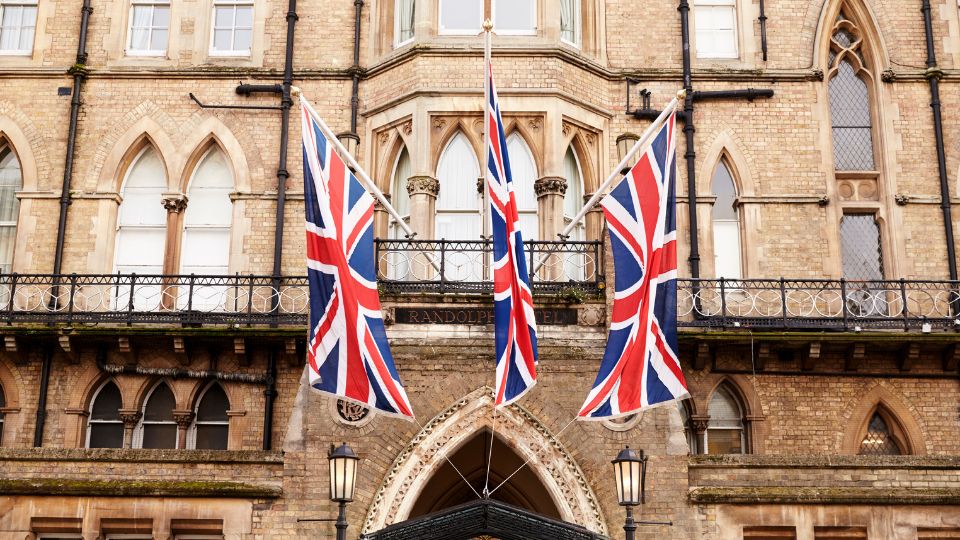
Hotel Waste Management Strategies
Hotel waste management is essential for minimising environmental impact and promoting sustainability.
With the significant waste generated daily, effective strategies are crucial to reduce costs and meet consumer demand for eco-friendly practices.
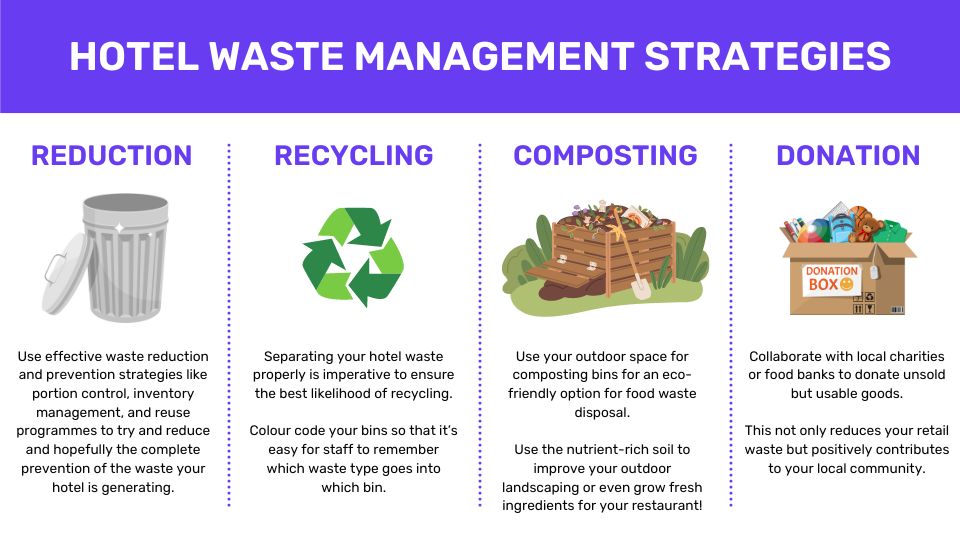
Waste Reduction & Prevention
Waste reduction and prevention strategies are integral to minimising the generation of waste within hotel operations.
By implementing proactive measures, hotels can significantly reduce their environmental footprint and improve resource efficiency.
Here’s an expansion on key initiatives:
- Implement Portion Control
Encourage portion control in dining areas and food service outlets to reduce excess food waste.
Train kitchen staff to prepare meals according to demand, avoiding overproduction.
- Optimise Inventory Management
Adopt efficient inventory management systems to track stock levels accurately.
This helps to prevent overordering of supplies, minimises food spoilage, and reduces unnecessary waste.
- Promote Guest Engagement
Educate guests about waste reduction practices and encourage their participation.
Provide information in guest rooms or common areas about the hotel’s sustainability initiatives, including options for reducing waste during their stay.
- Towel and Linen Reuse Programs
Implement towel and linen reuse programs to reduce water and energy consumption associated with laundering.
Encourage guests to use towels and linens multiple times before requesting replacement.
Source Separation and Recycling
Source separation and recycling are fundamental principles in effective waste management.
By segregating waste at its source and promoting recycling, hotels can divert a significant portion of waste from landfills.
Here’s how hotels can enhance source separation and recycling efforts:
- Educate Staff and Guests
Provide training to staff on proper waste sorting and recycling procedures.
Display clear signage and instructions for guests to encourage the correct disposal of recyclable materials.
- Invest in Recycling Infrastructure
Install designated recycling bins throughout the hotel premises, including guest rooms, public areas, and back-of-house facilities.
Ensure that recycling bins are easily accessible and clearly labelled for different waste streams.
- Partner with Recycling Providers
Collaborate with reputable recycling providers to ensure that collected recyclables are effectively processed and recycled.
Research local recycling facilities and establish partnerships to streamline the recycling process.
- Monitor and Evaluate Performance
Regularly monitor waste generation and recycling rates to track progress and identify areas for improvement.
Analyse data to optimise recycling programs and address any challenges or barriers to participation.
Composting Organic Waste
Composting organic waste presents an opportunity for hotels to divert biodegradable materials from landfills and produce valuable compost for landscaping and agricultural purposes.
Here’s how hotels can implement composting initiatives:
- Establish Composting Facilities
Set up composting facilities on-site to process organic waste, including food scraps and garden trimmings.
Designate composting areas equipped with compost bins or tumblers for aerobic decomposition.
- Train Staff on Composting Practices
Provide training to kitchen staff and housekeeping teams on proper composting techniques.
Emphasise the importance of segregating organic waste from other waste streams and maintaining composting bins.
- Utilise Compost for Landscaping
Use composted materials as soil amendments for landscaping and gardening projects on hotel grounds.
Enhance soil fertility and promote plant growth by incorporating compost into flower beds, vegetable gardens, and green spaces.
- Engage with Local Community
Explore opportunities to donate excess compost to local community projects or urban farms.
Partner with community organisations or schools to support sustainable agriculture initiatives and environmental education programmes.
Donation and Reuse Programs
Donation and reuse programs offer hotels a valuable opportunity to contribute to charitable causes, reduce waste, and support local communities.
Here’s how hotels can implement effective donation and reuse initiatives:
- Identify Surplus Food and Usable Items
Regularly assess inventory levels and identify surplus food and usable items that can be donated.
Coordinate with kitchen staff, housekeeping teams, and procurement departments to identify potential donations.
- Establish Partnerships with Charities
Forge partnerships with local charities, food banks, and nonprofit organisations to facilitate donations of surplus food and usable items.
Ensure that donations comply with food safety regulations and distribution guidelines.
- Repurpose Furniture and Linens
Evaluate furniture and linens for potential reuse within the hotel or donation to organisations in need.
Repair and refurbish items as needed to extend their lifespan and maximise their utility.
- Promote Social Responsibility
Communicate the hotel’s commitment to social responsibility and sustainability through marketing materials, website content, and social media channels.
Highlight donation and reuse initiatives to demonstrate the hotel’s positive impact on the community.
By implementing these waste reduction strategies, hotels can minimise their environmental footprint, enhance operational efficiency, and contribute to a more sustainable future.

Hotel Waste Laws and Regulations in the UK
In the United Kingdom, hotel waste management is governed by various regulations aimed at reducing environmental impact and promoting sustainability.
Key regulations include:
Environmental Protection Act 1990
The Environmental Protection Act 1990 serves as a cornerstone legislation for waste management and environmental protection in the UK.
It outlines the legal framework for regulating waste disposal practices and establishing responsibilities for waste producers, carriers, and disposal facilities.
Under this act, waste producers are required to exercise a duty of care in managing and disposing of their waste to prevent harm to human health and the environment.
This legislation imposes obligations on businesses, including hotels, to implement proper waste management practices, such as waste segregation, storage, and disposal.
It emphasises the importance of adopting environmentally responsible approaches to waste handling and encourages the adoption of waste minimisation strategies to reduce the overall environmental impact of waste generation.
Waste (England & Wales) Regulations 2011
The Waste (England and Wales) Regulations 2011 aim to promote sustainable waste management practices and encourage resource efficiency.
These regulations require businesses, including hotels, to segregate and recycle waste where feasible, with the overarching goal of minimising waste sent to landfill sites.
By promoting waste segregation at the source, these regulations facilitate the recovery and recycling of valuable resources, such as paper, plastics, metals, and glass.
Businesses are obligated to implement effective waste management systems that prioritise waste prevention, reuse, and recycling.
Hotels must provide designated bins for different types of waste, clearly labeled to facilitate proper segregation by staff and guests.
Compliance with these regulations not only helps reduce the environmental impact of waste disposal but also contributes to the efficient use of resources and the transition towards a circular economy.
Hazardous Waste (England & Wales) Regulations 2005
The Hazardous Waste Regulations 2005 govern the handling, storage, and disposal of hazardous waste to protect human health and the environment from potential risks and hazards.
These regulations classify certain types of waste, including chemicals, electronic equipment, and medical waste, as hazardous due to their potential to cause harm if improperly managed or disposed of.
Businesses, including hotels, must adhere to strict requirements for the identification, packaging, labelling, and transportation of hazardous waste.
Compliance with these regulations involves implementing robust management procedures to ensure the safe handling and disposal of hazardous materials.
Hotels are required to segregate hazardous waste from non-hazardous waste streams and arrange for its collection and disposal by licensed waste carriers or treatment facilities.
Landfill Tax Regulations 1996
The Landfill Tax Regulations 1996 aim to reduce the amount of waste sent to landfill sites by imposing a tax on waste disposal.
The tax serves as a financial incentive to encourage waste producers, including businesses and individuals, to adopt waste reduction, reuse, and recycling practices.
By increasing the cost of landfill disposal, these regulations promote alternative waste management methods that are more environmentally sustainable.
Hotels are subject to the landfill tax when disposing of waste at landfill sites, incentivising them to explore alternative waste management options, such as recycling, composting, and energy recovery.
By diverting waste from landfill, hotels can not only reduce their tax liabilities but also minimise their environmental footprint and contribute to the conservation of natural resources.
Compliance with the Landfill Tax Regulations requires hotels to accurately classify waste streams, keep detailed records of waste disposal activities, and report taxable waste to the relevant authorities.
Implementing waste reduction and diversion strategies not only helps hotels comply with regulatory requirements but also demonstrates their commitment to environmental stewardship and corporate social responsibility.
The Environment Act 2021
The Environment Act 2021 represents a significant milestone in the UK’s environmental legislation, aiming to address pressing environmental challenges and promote sustainability across various sectors.
While the Act encompasses a wide range of environmental issues, it includes provisions related to waste management and resource efficiency.
Key elements of the Environment Act 2021 relevant to waste management include measures to promote the circular economy, reduce plastic pollution, and enhance recycling infrastructure.
The Act reinforces the government’s commitment to achieving net-zero emissions and transitioning to a more resource-efficient and resilient economy.
By introducing new regulations and targets, the Environment Act 2021 seeks to drive innovation and collaboration in waste management practices, ultimately contributing to a cleaner and healthier environment for future generations.

Sustainable Practices in Hotel Waste Management
Energy-Efficient Equipment
Investing in energy-efficient equipment and technologies is a crucial step for hotels to reduce their environmental impact and operational costs.
By replacing outdated appliances and lighting fixtures with energy-efficient alternatives, hotels can significantly decrease energy consumption and lower carbon emissions.
Energy-efficient appliances, such as refrigerators, air conditioners, and heating systems, utilise advanced technologies to minimise energy wastage and optimise performance.
Additionally, upgrading to LED lighting can result in substantial energy savings and longer-lasting bulbs.
Furthermore, implementing smart energy management systems enables hotels to monitor and control energy usage in real-time, identifying areas for improvement and optimising energy efficiency throughout the property.
Water Conservation Measures
Water conservation is essential for hotels to minimise water wastage and preserve precious resources.
Implementing water-saving measures, such as installing low-flow faucets, showerheads, and toilets, can significantly reduce water consumption without compromising guest comfort.
These water-efficient fixtures use less water per use while maintaining adequate flow rates and functionality.
Additionally, hotels can implement rainwater harvesting systems to collect and store rainwater for landscaping and irrigation purposes.
By utilising rainwater for non-potable water needs, hotels can reduce reliance on municipal water supplies and conserve freshwater resources, especially during periods of drought or water scarcity.
Green Procurement Policies
Green procurement policies play a vital role in promoting sustainability throughout the supply chain and minimising the environmental impact of hotel operations.
By sourcing eco-friendly and sustainable products, hotels can reduce their carbon footprint and support environmentally responsible practices.
This includes selecting biodegradable toiletries, such as shampoo, soap, and body wash, that are free from harmful chemicals and packaged in recyclable materials.
Additionally, opting for recycled paper products for stationery, napkins, and tissue paper helps minimise the demand for virgin materials and reduces waste.
Furthermore, hotels can partner with suppliers who share their commitment to environmental stewardship and ethical practices, ensuring that products are sourced responsibly and produced in an environmentally sustainable manner.
By prioritising green procurement, hotels can demonstrate their dedication to sustainability and make a positive impact on the environment.

Hotel Waste Facts & Statistics
The hotel industry is a huge culprit for unnecessary waste generation.
See below for some shocking statistics on hotel waste!
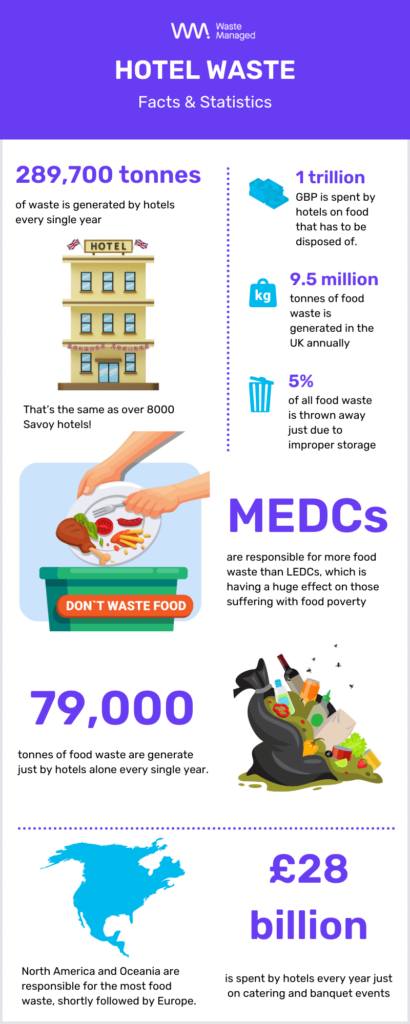
- Food waste costs the hospitality industry over £1 trillion per year
- More economically developed countries (MEDCs) generate more food waste than less economically developed countries (LEDCs) and this is having a massive effect on food poverty which currently affects LEDCs disproportionately.
- North America and Oceania are responsible for the most food waste, shortly followed by Europe.
- The hotel industry generates an average of 289,700 tonnes of waste every year.
- 79,000 tonnes of food waste are generated by hotels alone every year.
- The hotel industry spends over £28 billion on catering and banquet events.
- 5% of food waste is written off as unavoidable, but it can be as high as 20%.
- Due to improper food storage and other kitchen practices, 5% of all food is thrown away.
Conclusion
In conclusion, effective waste management practices are essential for UK hotel owners to navigate the complex landscape of waste regulations, minimise environmental impact, and promote sustainable operations.
By understanding the diverse nature of hotel waste and implementing comprehensive waste management strategies, hotels can achieve significant benefits, including cost savings, regulatory compliance, and environmental stewardship.
From implementing waste reduction and recycling initiatives to adhering to waste regulations such as the Environmental Protection Act 1990 and Waste (England and Wales) Regulations 2011, hotels have a range of tools at their disposal to manage waste responsibly.
Additionally, embracing sustainable practices, such as investing in energy-efficient equipment, water conservation measures, and green procurement policies, enables hotels to further reduce their environmental footprint and contribute to a cleaner, greener future.
Furthermore, creating partnerships with local charities, implementing donation and reuse programs, and engaging with the community can enhance social responsibility and strengthen ties with stakeholders.
By working collaboratively with guests, staff, suppliers, and regulatory authorities, hotels can create a culture of sustainability that permeates every aspect of their operations.
Ultimately, managing hotel waste is a multifaceted endeavour that requires commitment, innovation, and continuous improvement.
By prioritising waste reduction, recycling, and sustainability, UK hotel owners can not only meet regulatory requirements but also demonstrate leadership in environmental stewardship and contribute to a more sustainable hospitality industry.
Together, we can create a brighter future for generations to come.

